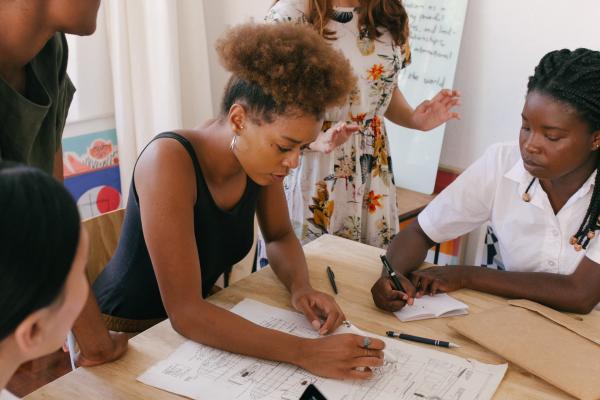ABC of psychology
Autonomy, relatedness - or Bonding - and Competence. These are the three universal psychological basic needs which are key to the long-term motivation, personal growth and emotional well-being of youngsters. Together they form the ABC of psychology.

Did you know this?
Just like plants need sunlight, water and minerals to grow, people need autonomy, relatedness - or bonding - and competence. They make you feel comfortable in your own skin and allow you to give it your all, time and time again. The better these needs are met, the more energy you have, the more flexibly you can act and the more resilient you are in coping with difficulties. Students who feel that their needs are met tend to be more motivated in their studies and perform better. However, when these basic needs are not entirely met, you are less likely to feel good and you will be more vulnerable to emotional problems.
The ABC of psychology
Eating and drinking sufficiently is essential for your physical well-being. Your mental well-being and resilience, however, rely on the fulfilment of your three psychological basic needs. This is true for everybody, regardless of age, gender or origin. But what exactly is meant by autonomy, relatedness – or bonding – and competence? And what happens when they are met and when they are not?
Autonomy
Autonomy is the need to be yourself, i.e., to feel free to share your opinions and make your own decisions. What you experience, imagine and feel is taken seriously and you are able to act authentically. You can be autonomous in your everyday life (for example by deciding how you want to spend your weekend) but also when dealing with key issues or turning points in your life. An example is you deciding what you want to study, whether or not to move out of your parents’ house and live in a student dorm, or who to choose as a life partner.
-
+ When this need is met, you feel free to be yourself and to think, act and feel as you please.
-
- When this need is not met, you feel restricted and under pressure.
Relatedness or bonding
Relatedness is the need to develop and maintain a warm, close bond with your loved ones. You experience relatedness when you know you mean something to someone, or when you belong to and feel part of a group, for instance your family, a student society or circle of friends.
You can bond through everyday experiences (like a nice chat or sending and receiving messages) but it can also go beyond that, for example when you take care of a sick parent or contribute to preserving the climate.

- + When this need is met, you feel a warm, intimate bond with others. You feel taken care of and are able to take care of others.
- - When this need is not met, you feel lonely and isolated.
Competence
Competence relates to the need to feel capable and skilled in what you are doing. You have faith in yourself and your ability to successfully complete your tasks and meet your challenges. This enables you to achieve your goals and take steps in your growth process. Competence manifests itself in everyday life and in more major life experiences. It can cover anything from cooking a good meal for your roommates to studying and passing your (driving) test.
- + When this need is met, you can develop your talents and skills, and achieve the goals that are important to you.
- - When this need is not met, you feel you are failing.
ABC and motivation
The three psychological basic needs have been analysed thoroughly as part of the self-determination theory, a valuable and powerful motivation theory. These needs were found to fuel your motivation. The more autonomous, connected and competent you feel during your studies, the higher your motivation levels and eagerness to learn, your enthusiasm and drive.

Reinforcing the ABC of psychology
Are you feeling energetic or rather lethargic? A lot depends on how well your ABC battery is charged. The extent to which your basic needs are met depends partly on your circumstances and surroundings. Maybe you feel lonely because you had a fight or because you are unable to study or work due to illness. Thankfully, you can also consciously choose to put on your ABC glasses and meet your needs yourself. When you are doing activities that fulfil your ABC needs, when you hang out with people or seek out situations that meet those needs, you actively contribute to your personal growth and well-being. You will also feel more energetic and comfortable in your own skin.
Being in control of your life: LifeCraft
LifeCraft is an online self-help programme that teaches you to look at your life through ABC glasses. By focusing more on how you can actively support and reinforce your own ABC needs, you learn to take control of your life.
Try LifeCraft and its featured tasks to discover how to spend more time on what you feel is truly important. Through your choices you can give direction to your life, charge your ABC battery and feel more energetic.
Supporting and reinforcing students’ ABC
As a lecturer or student advisor, you can reinforce students’ ABC by actively anticipating and responding to these needs in the organisation of your classes and guidance. Support the students’ autonomy, provide the required structure and assistance, and interact with them warmly. This approach supports their needs and is guaranteed to contribute to the students’ well-being, motivation to study and performance. Also try to pay more attention to the students’ ABC needs in more informal conversations, and guide them in meeting those needs in their daily lives.
Standing stronger: students & expert sharing their experiences
Host Carola talks to student Mathias and Maarten Vansteenkiste, professor in developmental psychology at Ghent University. The topic of this episode is the ABC of psychology.
Keen to learn, read or hear more about this topic?
Podcasts
- Standing stronger on MoodSpace
- Maarten Vansteenkiste: ‘De behoefte aan autonomie wordt bedreigd door de lockdown’ (Dutch)
Self-help
TED Talks
-
Vitamines voor groei - ontwikkeling voeden vanuit de zelfdeterminatietheorie (Dutch)
-
Hoe zorg ik ervoor dat ik mijn kind doet wat ik vraag? (Dutch)
Websites
- Motiverend lesgeven gives you more information about the ABC needs and shows you how to create an environment that supports students’ needs. (Dutch)
- Together with Impetus Academy, we developed the roadmap growth conversations that can fuel students' ABCs. This roadmap can be useful for guidance conversations, including internships.
Books
- Vansteenkiste, M. & Soenens, B. (2015). Vitamines voor groei. Ontwikkeling voeden vanuit de zelf-determinatie theorie. Acco. (Dutch)
Powerful stories
You are not alone. Get inspired by other students' stories about vulnerability and doubt. But above all about the power of connectedness.
Go to the stories